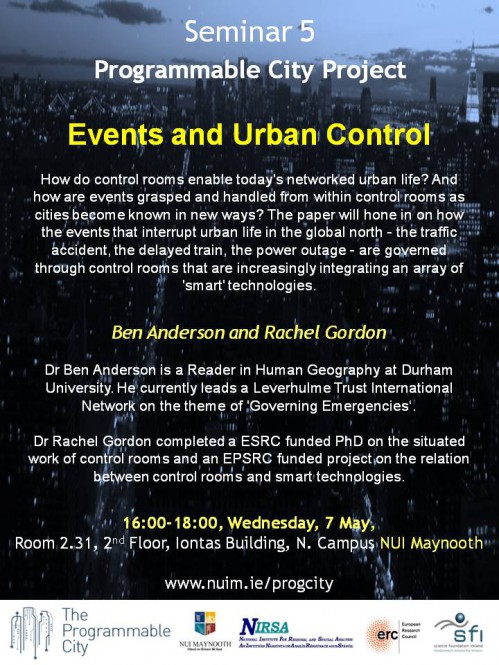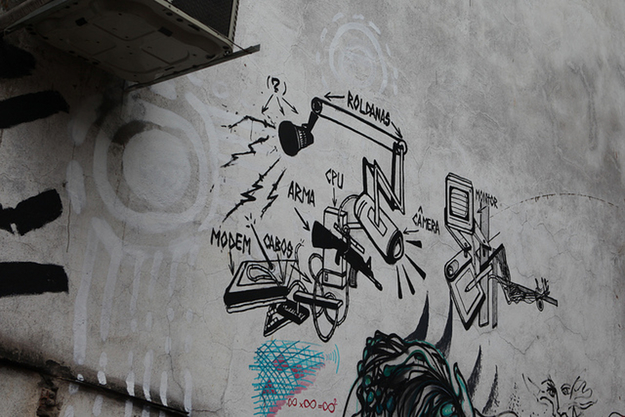Session 1: Software and Cities included papers from Matthew Wilson (Harvard and Kentucky Universities) and Martin Dodge (University of Manchester). Here are links to the slides the complete program.
Category Archives: events
Launch Videos: Introduction – Rob Kitchin, PI Programmable City Project, NIRSA, NUIM
Programmable City Launch Presentations
Below are the Programmable City Project Launch Presentations. The presentations are much more dynamic as some are animated while others include videos, but alas, sharing makes them a little static. The videos will soon be available, and watching them live will provide you with more of a sense of what the talks were about. Here is the full program.
Introduction: The Programmable City Project
- Rob Kitchin, PI Programmable City Project, NIRSA, NUIM
Session 1: Software and cities
- Matt Wilson (Harvard), Quantified Self-City-Nation
- Martin Dodge (Department of Geography, University of Manchester), Code and Conveniences
Session 2: Data and cities
- Tim Reardon (Assistant Director of Data Services, MAPC, Boston), Putting Data to Work in Metro Boston
- Tracey P. Lauriault (Programmable City team), A genealogy of open data assemblages
Session 3: Smart Cities
- Siobhan Clarke (Trinity College Dublin), ICT-Enabled Behavioural Change in Smart Cities
- Adam Greenfield (London School of Economics), Another city is possible: Networked urbanism from above and below? Visit Adam’s Website UrbanScale
Session 4: Programmable City PhD/Postdoc projects & Gavin McArdle – Dublin City Dashboard Demo
- Robert Bradshaw, Smart Bikeshare
- Dr Sophia Maalsen, How are discourses and practices of city governance translated into code?
- Jim Merricks White, Towards a Digital Urban Commons:Developing a situated computing praxis for a more direct democracy
- Alan Moore, The Role of Dublin in the Global Innovation Network of Cloud Computing
- Dr Leighton Evans, How does software alter the forms and nature of work?
- Darach Mac Donncha, ‘How software is discursively produced and legitimised by vested interests’
- Dr Sung-Yueh Perng, Programming Urban Lives
- Dr Gavin McArdle, NCG, NIRSA, NUIM, Dublin Dashboard Performance Indicators & Metrics
Seminar: Events and Urban Control by Ben Anderson and Rachel Gordon, 7 May
The fifth Programmable City seminar will take place on May 7th. Based on some detailed ethnographic work, the paper will focus on the workings of control rooms in governing events.
Events and Urban Control
Ben Anderson and Rachel Gordon
Time: 16:00 – 18:00, Wednesday, 7 May, 2014
Venue: Room 2.31, 2nd Floor Iontas Building, North Campus NUI Maynooth (Map)
Abstract
How do control rooms enable today’s networked urban life? And how are events grasped and handled from within control rooms as cities become known in new ways? The paper will hone in on how the events that interrupt urban life in the global north – the traffic accident, the delayed train, the power outage – are governed through control rooms; control rooms that are increasingly integrating an array of ‘smart’ technologies. Control rooms are sites for detecting and diagnosing events, where action to manage events is initiated in the midst multiple forms of ambiguity and uncertainty. By focusing on the work of control rooms, the paper will ask what counts as an event of interruption or disruption and trace how forms of control are enacted.
About the speakers
Dr Ben Anderson is a Reader in Human Geography at Durham University. Recently, he has become fascinated by how emergencies are governed and how emergencies govern. He currently leads a Leverhulme Trust International Network on the theme of ‘Governing Emergencies’, and is conducting a geneaology of the government of and by emergency supported by a 2012 Philip Leverhulme Prize. Previous research has explored the implications of theories of affect and emotion for contemporary human geography. This work will be published in a monograph in 2014: Encountering Affect: Capacities, Apparatuses, Conditions (Ashgate, Aldershot). He is also co-editor (with Dr Paul Harrison) of Taking-Place: Non-Representational Theories and Geography (2010, Ashgate, Aldershot).
Dr Rachel Gordon completed a ESRC-Funded PhD on the situated work of control rooms, with particular reference to transport systems and to how control rooms deal with complex urban systems. She currently coordinates an Leverhulme Trust international network on Governing Emergencies, after completing an EPSRC funded project on the relation between control rooms and smart technologies.
Seminar reminder: Citizens, Data, Virtual Reality and the Internet of Things
Welcome back!
After the Launch event earlier this week, we are really happy to have Dr Andy Hudson-Smith to discussion Citizens, Data, Virtual Reality and the Internet of Things! Please see the details of our next seminar below.
Time: 16:00 – 18:00, Wednesday, 2 April, 2014
Venue: Room 2.31, 2nd Floor Iontas Building, North Campus NUI Maynooth (Map)
Abstract
Every day, we create 2.5 quintillion bytes of data — so much that 90% of the data in the world today has been created in the last two years alone. This data comes from everywhere: sensors used to gather climate information, posts to social media sites, digital pictures and videos, purchase transaction records, and cell phone GPS signals to name a few (IBM, 2103). This data can, compared to traditional data sources, be defined as ‘big’. Cities and urban environments are the main sources for big data, every minute 100,000 tweets are sent globally, Google receives 2,000,000 search requests and users share 684,478 pieces of content on Facebook (Mashable, 2012). An increasingly amount of this data stream is geolocated, from Check-ins via Foursquare through to Tweets and searches via Google Now, the data cities and individuals emit can be collected and viewed to make the data city visible, aiding our understanding of now only how urban systems operate but opening up the possibility of a real-time view of the city at large (Hudson-Smith, 2013). The talk explores systems such as The City Dashboard (http://www.citydashboard.org) and the rise of the Internet of Things (IoT) in terms of data collection, visualization and analysis. Joining these up creates a move towards the Smart City and via innovations in IoT a look towards augmented reality pointing towards the the creation of a ‘Smart Citizen’, ‘the Quantified Self’ and ultimately a Smart City.
IBM (2103), Big Data at the Speed of Business, http://www-01.ibm.
Mashable (2012), How Much Data is Created Every Minute, http://mashable.com/
Hudson-Smith (2013) – Tagging and Tracking, Architectural Design, 01, 2014, High Definition, Zero Tolerance in Design and Production.
Speaker bio
Dr Andrew Hudson-Smith is Director of the Centre for Advanced Spatial Analysis (CASA) at The Bartlett, University College London. Andy is a Reader in Digital Urban Systems and Editor-in-Chief of Future Internet Journal, he is also an elected Fellow of the Royal Society of Arts, a member of the Greater London Authority Smart London Board and Course Founder of the MRes in Advanced Spatial Analysis and Visualisation and MSc in Smart Cities at University College London.
Public Event – Rethinking the Smart City: A Primer
The Programmable City project is excited to be supporting an upcoming public discussion with Adam Greenfield around the concept of the smart city.
When: March 24th 7pm – 9pm
Where: Dunlop Oriel House, Corner of Fenian Street 7 Westland Row, Dublin 2
Map: Speakers: Adam Greenfield, with an introduction by Rob Kitchin
Respondents: Aphra Kerr (NUIM), Jim Merricks White (NUIM) Rachel O’Dwyer (TCD)
The event is organised by Provisional University & Dublin Art & Technology Association.
Admission is free but places are limited. To book go to .
It’s generally understood that a smart city refers to integrated information and communication technologies, embedded sensor networks and smart girds rapidly becoming part of the infrastructural fabric of our cities, and contributing to its overall function and management. But the smart city is not just an informational overlay. It extends to a broader rationality for resource management (water, energy, transport, air), for governance and agency administration, and for economic stimulation.
While this is significant, various factors seem to have prevented extended public discussion about smart cities. This might be because planning for the smart city is still limited to academic research institutions and government initiatives. It might also be the case that the disciplinary approach to the smart city means it doesn’t always join up with other relevant discussions about urban planning and policy, resource management and the right to the city currently taking place, even though we share and articulate many of the same concerns. We therefore see this event as a primer for more ongoing discussion on the smart city, as it relates to these broader issues and particularly as it relates to Dublin City.
What are we talking about when we talk about the smart city? What limitations are there to the way that the smart city is currently articulated? What alternatives might exist?
Biographies:
Adam Greenfield is a writer, urbanist and founding director of New York City-based design practice Urbanscale. His work focuses on the intersection of design, technology and culture, with a strong interest in urban form and metropolitan experience. Greenfield is the author of Everyware: the Dawning age of Ubiquitous Computing (New Riders, 2006) and Against the Smart City (The city is here for you to use) alongside Nurri Kim (Do Projects, 2013). Adam is also Senior Urban Fellow at LSE Cities.
Rob Kitchin is a professor and ERC Advanced Investigator in the National Institute of Regional and Spatial Analysis at the National University of Ireland Maynooth. His book ‘Code/Space’ (with Martin Dodge) won the Association of American Geographers ‘Meridian Book Award’ for the outstanding book in the discipline in 2011. He is currently a PI on the Programmable City project, the Digital Repository of Ireland, and the All-Island Research Observatory.



